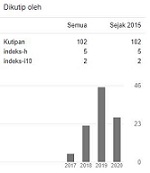TANDUK MAJENG (MADURA’S SONG) AS MEDIA TO IMPROVE ENGLISH SKILL AT PAUD BADRUZ ZAMAN
Abstract
English learning has been given in formal education, but the methods used are usually less interesting and make some children bored and have difficulty understanding the material presented. Therefore, the implementation of the traditional tanduk majeng song as media in improving English skills at PAUD. Badruz Zaman is expected to make it easy for children to learn English and make learning English fun with interesting method. This activity is carried out for Pre-Primary School so that they have English language skills in vocabulary, language structure, listening and reading. In addition, this activity is also expected to create children who will be ready to compete in the world of education with English language skills.
Keywords
References
Nishanthi, R. (2018). The Importance of Learning English in Today World. International Journal of Trend in Scientific Research and Development, Volume-3(Issue-1), 871–874. https://doi.org/10.31142/ijtsrd19061
Doodington, C & Hilton, M. (2010). Pendidikan Berpusat Pada Anak (Alih bahasa: Febrianti Ika Dewi). Jakarta: Indeks.
Abi Hamid, Mustofa, dkk. (2020). Media Pembelajaran. Medan: Yayasan Kita Menulis.
Sugiyono, 2020. Metode Penelitian Kualitatif. Bandung: Alfabeta.
Sugiyono (2019). Metode Penelitian Kuantitatif, Kualitatif, dan R&D. Bandung : Alphabet.
Sopya, Ida Vera. (2018). "Pembelajaran Bahasa Inggris Melalui Lagu Pada Anak Usia Dini". ThufuLA: Jurnal Inovasi Pendidikan Guru Raudhatul Athfal 1.1: 1-21.
Lutfiyatul Husna, Ahmad Ma’ruf. (2019). “IMPLEMENTASI METODE GERAK DAN LAGU UNTUK MENINGKATKAN KOSAKATA BAHASA ARAB DAN INGGRIS (di Taman Kanak-Kanak Pesantren Anak Sholeh Al-Ihlas Capang)” 4, no. 1: 43–60.
Dewi Maratus Sholikhah. 2012-2013. Etnografi Madura (Soa255). Makna Lagu“Tanduk Majeng”. Program Studi Antropologi Fakultas Ilmu Sosial Dan Ilmu Politik, Universitas Airlangga.
Nyota, S. & Mapara, J. (2008). Shona Traditional Games and Play: Songs Indigenous Way of Knowing. The Journal of Pan African Studies. Vol.2 No. 4: 189-202, (Online), (https://www.researchgate.net), diakses 12 November 2022.
Novi Mulyani. (2016). Super Asyik Permainan Tradisional Anak Indonesia. Yogyakarta: DIVA Press.
DOI: 10.53712/ellite.v6i1.1766
Refbacks
- There are currently no refbacks.







